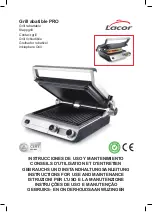
Copies of the I/B. Please reproduce them without any
changes except under special instruction from Team
International USA. The pages must be reproduced and folded
in order to obtain a booklet A5 (+/- 148.5 mm width x 210 mm
height). When folding, make sure you keep the good
numbering when you turn the pages of the I/B. Don’t change
the page numbering. Keep the language integrity.
Print only
what is inside the frame.
7
GR 38892 - 130424
Assembly page 7/72
Fax +1 305 430 9692
TIPS
•
Prior to plugging the Rollie
TM
Eggmaster Grill into a wall outlet,
make sure it is thoroughly cleaned.
•
Use regular or large eggs (for best results use conventional eggs
with no additives).
•
Use no more than two large eggs at one time.
•
Prior to each use, spray “NON STICK COOKING OIL SPRAY” in the
cooking chamber.
•
Do not mix the egg yolk with the egg white (do not beat the eggs
unless it is described in the Rollie
TM
recipe book).
•
It is normal for the first cooked product to vary from the next one,
•
Cooking time may vary, depending on the type of food, initial
temperature or quantity of food to cook.
•
Wooden skewers are helpful and can be used in a variety of
ways:
o
For example, when inserting a rolled tortilla wrap, or a
similar rolled product into the cooking chamber, it is helpful
to use a skewer for pushing the rolled product into the
cooking chamber, and making it snug against the walls
and wide open in the middle.
o
Wooden skewers can be inserted into the food during the
cooking cycle, to help pull the product out.
o
Only use wooden skewers, such as the ones supplied.
Metallic ones might permanently damage the non-stick
coating in the cooking chamber.
•
Eggs can be cooked in a variety of ways; you do not need to
wait until the eggs are fully cooked: eggs can be poured out
earlier or later, for soft, medium, or hard cooking results.
•
Scrambled eggs grow in volume when being cooked. To reduce
this effect, we recommend mixing the beaten eggs with ground
crackers, making sure not to fill the cooking chamber to more
than half of its volume.
•
All food, and especially meat and poultry, should be thoroughly
defrosted before cooking.
•
We recommend the use of a meat thermometer to ensure the
food is cooked thoroughly.








































